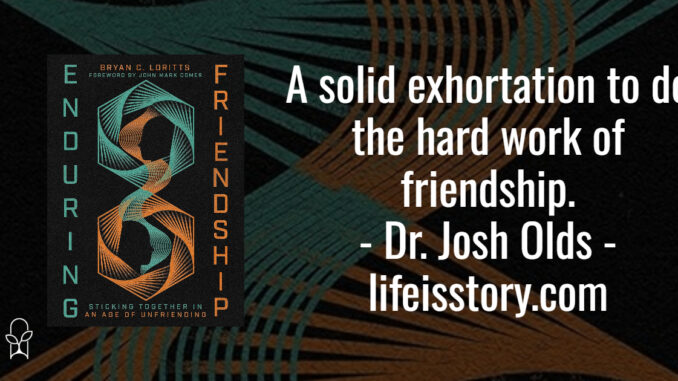
Also by this author: The Offensive Church: Breaking the Cycle of Ethnic Disunity
Published by IVP on March 12, 2024
Genres: Non-Fiction, Christian Life
Buy on Amazon
Goodreads

Friendships are difficult.
Sometimes it can seem as if friends are more work and pain than they're worth, with friendship challenges that we have to endure and struggle through. Life gets in the way of our well-intentioned efforts to connect. Conflicts and differences over serious issues divide us and make us think that we could never be close to a person ever again. In today's cancel culture, it's easy to give up on people and just walk away, leaving us all more isolated than before. How can we build real relationships that are life giving and pass the test of time?
Bryan Loritts mines one of the Bible's least-known books for insights into how friendships can flourish even in the midst of sin and brokenness. With careful exposition and insight, he unpacks how the apostle Paul helped Philemon and Onesimus reconcile a most unlikely relationship with truth, repentance, and grace. With God’s work and steadfast love, even the most painful relationships that have ruptured are not beyond the reach of forgiveness and reconciliation. Discover how friendships that are hard can be transformed into friendships that endure.
Good friendships are hard to find. They’re even harder to keep. In this short volume, using the book of Philemon, Bryan Loritts walks readers through the value of Enduring Friendship. Loritts begins with his own story of lost friendships. I was struck by how much it mirrored my own, perhaps indicative of the way a lot of friendships in your early 20s go—you just simply grow up and grow apart.
It’s interesting that Loritts uses the example of Philemon and Onesimus to make his point. Because, if you know the story, theirs was not exactly a friendship. Onesimus was Philemon’s slave, one who had run away and now was returning at the apostle Paul’s behest. However, here’s the important part, Paul was having Onesimus return not as a slave but as a friend. The old way of relationship was gone; a new way of relationship was here. Loritts does a good job of interweaving his own experience with biblical exposition, creating a biblically-rich and personal narrative that gives both biblical teaching and how that teaching can be brought into practice—or what can happen when it is not.
The two biggest takeaways from Enduring Friendship is that friendship requires grace and friendship requires equality. First, enduring friendships assume that, at some point, there will be the need to ask for and give out forgiveness. This is one of the most important points that Loritts makes. Friendships only endure if you’re willing to forgive and repent. The closeness of friendship causes friction. Think about a car engine and all its gears and moving parts. The closeness of the parts is necessary for the engine to function. But that creates friction. And friction creates heat. And heat can cause it all to blow. Unless you have oil. The oil of forgiveness and repentance (through the Holy Spirit) keeps the whole thing running. In this story of Philemon and Onesimus, there is a need for both parties to offer forgiveness and repentance.
Second, enduring friendships require equality. This has been the primary problem between Philemon and Onesimus. They have not been equal. Onesimus has been a slave. Philemon has held improper authority over him. While Loritts doesn’t really draw much on this, I think it’s worth continuing that analogy to point out that the problem isn’t that one person has authority over another—it’s that the authority is improper and absolute. Friendship can exist among imbalances. I have a friend who is a medical doctor. I trust his medical authority over my own. But that trust is voluntary and contextual, not demanded and absolute.
If I had to offer a criticism of Enduring Friendship, it’s that, while a unique take on friendship, the relationship between Onesimus and Philemon is not always the best analogue for modern friendships outside of the rather basic concepts that relationships require mutuality, grace, repentance, and a commitment to the relationship. This works well when both people commit to it, but what if one person refuses? How do we maintain relationships when, due to past relational trauma, one or both individuals are prone to running away? How do we navigate major life changes in friendships such as new jobs, spouses, kids, or moving away? Is there ever a time we should end a friendship? Enduring Friendship doesn’t necessarily address these topics, meaning that while what Loritts writes is good, it is incomplete. Overall, though, it is a solid exhortation toward the hard work of friendship. When it is so easy to cut ties or never develop them, Lorrits reminds us of how important these tethers are to our humanity.
